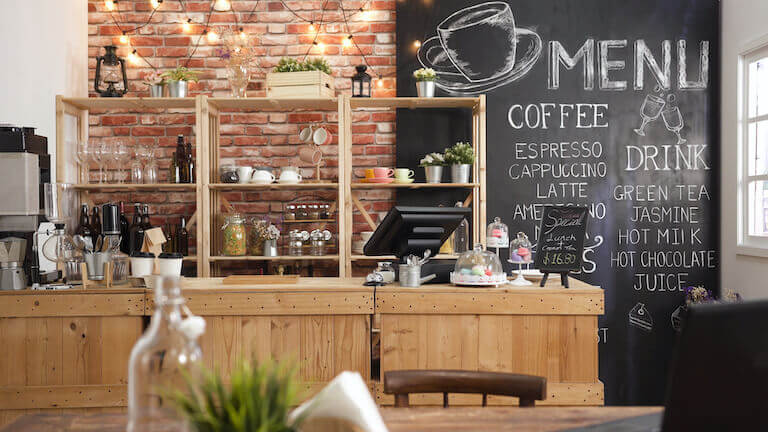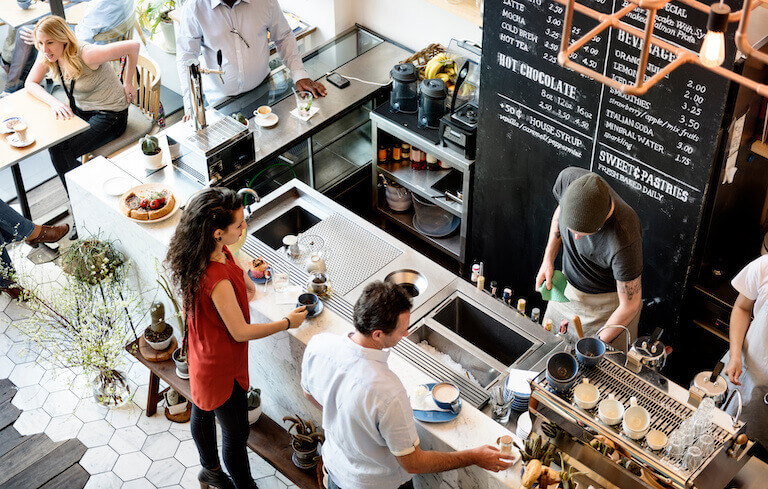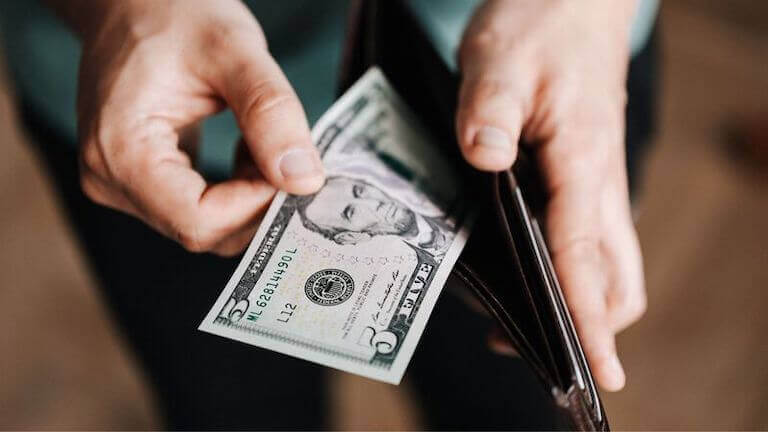Do you consider yourself a coffee fanatic? Are you inspired by the passion, craftsmanship, and artistic flair behind a great cup of coffee?
Dreaming of starting your own food business one day? Pursuing a career in food entrepreneurship? If you’re saying yes to any or all of these questions, you might consider opening your own coffee shop!
Ever since the creation of the first coffee houses in the 16th century, coffee shop businesses have helped to deepen bonds within communities. Modern day coffee shops do everything from serving pastries to doubling as brunch spots, workspaces, and music venues.
And the coffee industry is showing no signs of slowing down, with the market in the United States being projected to grow annually by 4.72% until 2030.
If you’re a budding entrepreneur and are looking to join the rich legacy of bringing people together through the art of coffee, follow along with our step-by-step guide to opening your own coffee shop.
*Note: Auguste Escoffier School of Culinary Arts does not provide legal advice. Always consult with an attorney before creating a new business entity!
Decide on a Concept for Your Coffee Shop
The first step of your entrepreneurial journey is to decide which type of coffee shop you’re looking to open. This is a great opportunity to get creative and put your own unique spin on a coffee business! The size and scope of your coffee shop will determine everything from your business plan to securing financing to the permits that you may need to obtain. What are some guiding factors to consider when planning your coffee shop concept?
Start With Your Customer Base
Identify your target demographic. Are you looking to appeal to millennials who are seeking trendy, specialty coffee drinks? Or do you want to serve customers who are looking for a quick cup of coffee and a light breakfast before work? Analyze and stay on top of trends in the market in order to ensure that your business is conscious of what your target customers are currently looking for.
Determine Your Offerings
Decide whether you’ll be offering food, and if so, whether this food will be pre-made or made in-house with a full kitchen. This decision could influence everything from your staff and equipment budget to your table sizes and inventory needs.
Visualize Your Space
Take the time to design or decorate an interior space that both shows personality and knowledge of current trends, and takes the comfort of customers into consideration. Do you want to encourage feelings of community and lively camaraderie? Or do you want your coffee shop to serve as a tranquil, quiet workplace for students or professionals? Consider the sizing options for your tables and how you will space out your furniture to form the environment you’re looking to create.

There’s no shortage of coffee shop concepts to explore.
Create a Business Plan
Now that you have a clear vision for what kind of coffee shop you want to open, setting the right foundations for the shop is crucial to getting it off the ground. Ideally, you’re looking to create a business that is scalable and sustainable. A business plan is essential for demonstrating your knowledge of the coffee market and your desired space within it. This is the tool that can best help you get investors on board.
Here are the potential components to creating a business plan that may grab the attention of investors.
An Executive Summary
This should introduce your business and provide a short summary of all of the components of your business plan. This information should include your company name and a short mission statement, the problem that you’re looking to solve and why, your solution, target market, competition, anticipated team roles, financial plan, and any funding requirements.
A Company Description
Now that you’ve established your vision for your coffee shop, it’s your time to showcase it to the world! Specify your niche, why you decided upon it, and what your coffee shop will help provide to customers.
A Competitive Analysis
Research all of the local coffee shops in your area, and identify how your coffee shop will stand out among these shops as well as any bigger chains. This will also help to inform your pricing and help you stay competitive in the market.
An Organization Plan
Who will make up your staff? Will there be baristas, chefs, waitstaff, etc.? What will your customer service policies be? These are all questions to consider when writing a plan for how your coffee shop will operate from a structural standpoint.
Financial Projections
Include a breakdown of your startup costs, pricing strategy, operating costs, income statement, projected cash flow, and a break-even analysis.
Education and Experience
Listing any prior entrepreneurial or kitchen experience can help make your business plan more appealing to investors by highlighting your knowledge. Include any related degrees, diplomas, or certificates you’ve earned, as well as any businesses or initiatives you’ve already founded or co-founded.
Choose Your Business Location
The location of your coffee shop can factor greatly into the success of your business, so it’s important that these factors are considered when choosing where to operate. To help you decide on a location, it might be helpful to ask yourself the following questions:
- How heavily trafficked is the area where you’re considering opening up your shop?
- What are the busiest times of day that you’ve observed in this location?
- Which demographics seem to frequent this area most often?
- Where is your competition located?
- How accessible is your location? For example, can it be best accessed by foot, car, or public transit?
These questions can all help you to determine whether your location may allow your coffee shop concept to be successful. For example, let’s say your target demographic is a crowd that tends to be older than Millennials–perhaps Gen X or Baby Boomers. You may be looking to provide them a calm, quiet atmosphere, where they can relax, read, or connect with one another. Choosing a coffee shop location that can only be accessed by foot and is mostly frequented from the evening onwards might not allow you to appeal to this demographic. Make sure your coffee shop is easily accessible for the demographic you seek to serve.

Coffee shops are hubs for bringing communities closer together.
Create a Menu
First impressions are everything when it comes to opening a food business, and it’s important to make sure that you make a strong one with your menu design and content. Your menu immediately allows customers to gain insight into the priorities and personality of your business, as well as the overall experience that they’re likely to have.
So, what are some elements to consider regarding your menu choices?
Make sure that your menu correlates with your hours of operation. After establishing when your location is the busiest, it could be helpful to tailor your menu to this time of day. For example, if foot traffic is the heaviest in the late afternoon, you might omit breakfast items from your menu and opt for a menu that serves light lunch options.
Organize your food and drinks into categories of related items. For example, many coffee shop menus group together hot caffeinated beverages, cold caffeinated beverages, non-caffeinated beverages, small plates, or pastries. The key is to make sure that customers don’t have to search too long to find any menu item.

Determine your portion sizes to fit with your coffee shop concept. For example, if you’re planning on catering to on-the-go morning commuters, consider smaller portion sizes that can be eaten quickly or while commuting. This can also help you to determine the size of the tableware that you might use.
Decide how much information to share about your items. Do you want to tell the story behind your drinks as part of your branding, or keep it simple and put all of the focus on the items themselves? On the subject of branding, your menu is an excellent opportunity to display your coffee shop’s theme and personality. These choices should reflect the overall look and feel of your coffee shop. If you’re catering your coffee shop to an audience of Gen Z and Millennials, for example, it might be beneficial to use more casual language and analyze visual design trends popular with this demographic.
Consider Restaurant Startup Costs
How much can it cost to open up a coffee shop? This is a question likely to be on any food entrepreneur’s mind. The right financial planning can help ease doubts about affordability and help you understand what you may gain financially.
We’ve provided you with a general framework for how to calculate your expenses, as the exact costs will be highly dependent upon your individual business plan. Always consult a financial professional for your specific situation.
Renting vs. Leasing a Restaurant Space
The cost of renting or buying a space will probably vary greatly depending on the size and location of your business, but here are some guidelines to help you get an idea of how much you might need to pay for a space.
Renting can be a great option for a first-time business owner because it offers more flexibility to move locations or expand slowly depending on your business’ outlook. If the space that you’re renting also previously served coffee, it might even come with the equipment you need to give your business a head start.
For a small coffee shop in a less densely-populated location, rent might cost a few hundred dollars a month. For a larger coffee shop that’s located in a major city, you can expect to pay a couple thousand dollars per month.
Note that rent should not exceed more than 6 to 8 percent of your monthly sales. For example, if you project $100,000 in sales per month, your monthly rent payment should be $15,000 or under.
If you plan on buying your own space, you can expect to pay more upfront. On average, the cost range of an established coffee shop typically falls between $80,000 and $275,000, depending on location, square footage, traffic, revenue, and operating costs.
Lease Security Deposit
This cost varies a lot depending on the size and location of your business. On a retail lease, the security deposit cost may be three times your monthly rent.
Kitchen Equipment Costs and Food Supplies
Equipment costs could also vary greatly depending on your menu choices. Investing in reliable equipment is essential to sustaining your business. According to Groupon Merchant, here’s how much you can expect to pay for this equipment.
- Quality commercial espresso machine: from $2,000 to $20,000
- Coffee maker: $50 for a basic 12-cup machine to $2,500
- Coffee roasters: from $3,000
- Refrigeration system: $500 to $12,000
- Blenders: from $300 to $2,000
- Water filtration system: $1,500 to $10,000
The cost of food supplies is also highly dependent on your menu selections. On average, it is recommended to set aside between $5,000 and $25,000 in monthly food costs.
Payment System Costs
A Point of Sale (POS) system is essential to running a business. These systems usually cost $1,700 for the initial upfront investment and then around $1,400 yearly to keep using the software.
Marketing
The amount of money that small businesses spend on marketing has increased in recent years. These expenses have increased about 4% in 2023 from the last 2 years. Hubspot reported the average spend for businesses on their marketing campaigns last year was 8.7% of their total revenue. It is recommended to spend between 7% and 10% of your gross revenue on marketing.
Staff Salaries
Hiring a skilled team is an essential part of building and sustaining a successful business. Keep in mind that you should be prepared to pay fairly competitive wages and/or offer enticing job perks if you want to hire and retain dependable talent.
Furniture Costs
Furniture costs for the interior and exterior of your shop will depend on the furnishing plans that you have for your individual business, but options like chalkboard walls, purchasing furniture from consignment stores, and repurposing furniture can be more budget-friendly.
Permitting, License, and Legal Fees
There are a series of fees that must be paid to ensure that entrepreneurs are authorized to be running a foodservice business. Here’s a breakdown of the permitting, license, and legal fees that you may need to consider:
- Business license: this cost varies by state–in New York, for example, a business license can cost between $50 and $150.
- Certificate of occupancy: this cost varies according to location, but the average estimate is around $250.
- Food manager permit: a permit can range from $150 to $200 depending on what state you’re in.
- Liquor licenses if serving alcohol: this cost is dependent on location. A full-service liquor license can cost between $100 to $14,000, but the average cost is around $1,500.
- Sign fees and permits: these fees are also dependent on location–in Chicago, for example, this can range from $250–$1200, depending on the size of the sign.
- Hiring a business lawyer to navigate legalities: on average, this can cost from $150 to $325 an hour.
Overall, the cost of launching a coffee shop can range from $80,000 to $275,000 depending on your individual business plan.
Estimated Coffee Shop Startup Costs
- Leased coffee shop space: a few hundred to a few thousand dollars a month
- Equipment costs: $7,350 – $49,500
- POS system: $1,700 and $1,400 yearly
- Marketing: between 7% and 10% of revenue
- Permitting, licensing, and legal fees: a few hundred to thousands of dollars. This varies depending on the permits required and legal costs.
- Restaurant furniture and supplies: varies depending on the size of the restaurant and quality of furnishings—chairs alone can range from $26–$300+.
- Staff salaries: varies depending on location.
- Food supplies: monthly food costs are between $5,000 and $25,000
Raise Money for Your Business
Secure Grants
Grants are a great option for starting a small business because they usually don’t need to be repaid. Auguste Escoffier School of Culinary Arts alumna Tiffany Moore received two grants to get her startup capital.* One was through StreetShares, which awards grants to military veteran entrepreneurs. The other was through Fiserv, a financial services tech provider that also provides some grants to small businesses.
Obtain a Business Loan
Some banks and credit unions can provide small business loans, especially if you already have relationships with those institutions. Outside financing is a great way to build startup capital, as long as you effectively manage your finances and are careful to not overborrow.
Some restaurants can get a 504 loan through the U.S. Small Business Administration (SBA). These loans are accessed through a “Certified Development Company” which provides government-backed SBA loans.

Getting a loan to start your coffee shop can be an excellent option for new entrepreneurs.
Bring on Private Investors
Private investors can invest in your small business in exchange for a portion of the profits. You can bring them on as partners to handle some of the workload, or they can be “angel investors” who take a hands-off approach and instead, let you run the business on your own—as long as they’re receiving their share of the profits. Networking events like the Hospitality Industry Technology Exposition & Conference (HITEC) can help you to meet potential investors for your business.
Explore the Use of Crowdfunding
If you already have a group of people supporting your restaurant concept, crowdfunding may be a beneficial funding option. By pitching your restaurant on platforms like GoFundMe and Kickstarter, you can gain financial support from individuals.
If you’d like, you can also encourage donations by offering future rewards like discounted meals or invitations to a soft opening. This does not require investors to receive equity, but rather just a predetermined benefit for investing in the business.

Small donations from many people can make a big collective impact.
Market Your Coffee Shop
Even with a unique theme that captivates customers, a great location, and a well-established business plan, your coffee business can’t thrive if enough customers don’t know about it. That’s why it’s important to employ strategic marketing techniques.
Social media marketing can be an extremely important asset for helping you reach potential customers, so it’s important to establish a brand identity on Instagram, Facebook, X, and TikTok. You can also pay to boost your posts.
The use of email marketing campaigns, digital advertisements, and public relations (PR) services can be excellent methods to help you capture a wider audience beyond social media as well. It’s also important to create an identifiable and cohesive website and brand identity. Squarespace and Wix have plenty of templates that are made specifically for creating a website for a restaurant.
Make sure to design a logo and signage that best represents the identity and personality of your business. Deciding on the identity that your business will embody is key to making sure that you connect with your customers on a more personal level. Branded merchandise can also help to spread the word about your business while conveying its personality.
Open Your Own Coffee Shop…Or Start Preparing Now!
If you’re interested in utilizing your creative, business, and marketing skills to offer customers a memorable coffee shop experience, starting your own coffee shop might be the right decision for you!
For more information on building a strategy for launching your own food business, check out Escoffier’s Food Entrepreneurship program and get started on your new culinary journey today.
EXPLORE MORE ENTREPRENEURIAL CAREER PATHS IN THESE ARTICLES:
- How to Start a Food Truck
- How to Start a Restaurant
- The Ultimate Guide to Starting a Home-Based Catering Business
*Information may not reflect every student’s experience. Results and outcomes may be based on several factors, such as geographical region or previous experience.



